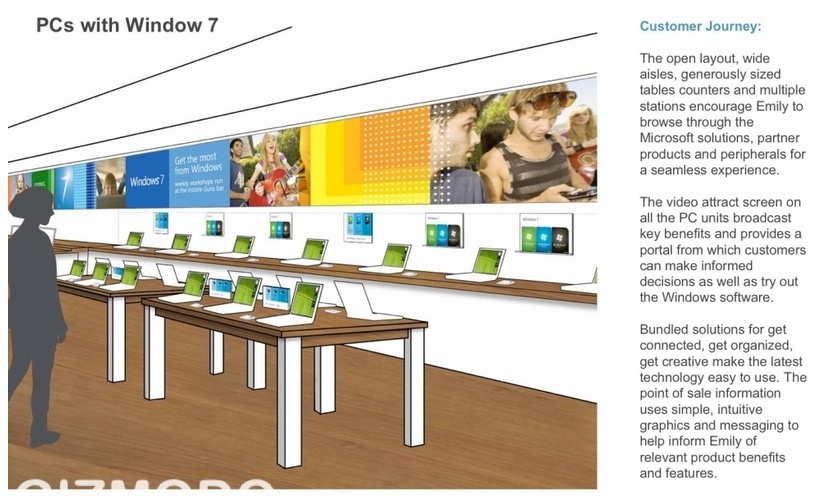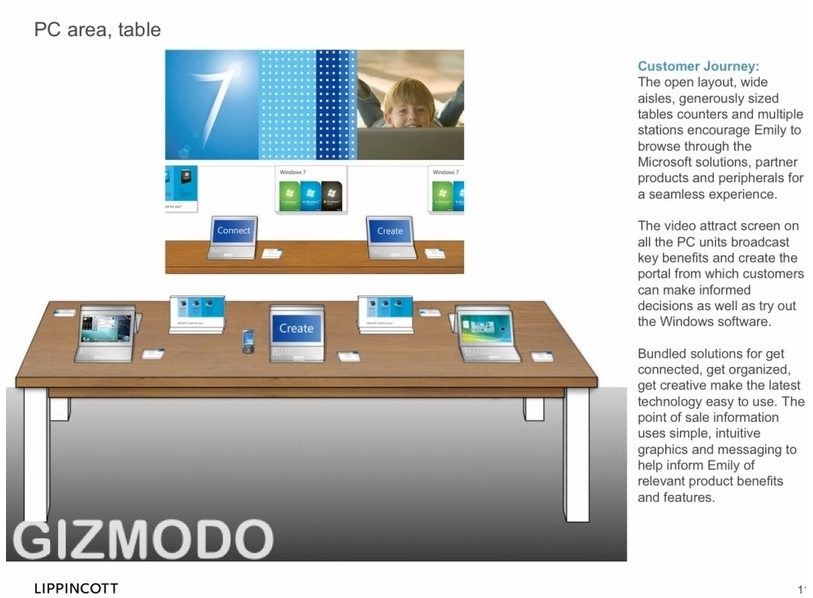With the October 22nd release of Windows 7 just around the corner, Microsoft is also putting the final touches on its first two retail stores which are scheduled to open in Scottsdale, Arizona and Mission Viejo, California in just a few weeks.
Microsoft first announced its plans to open up its own branded retail stores back in February. Microsoft explained that it was getting into the retail business as a means to connect more directly with customers, exert better control over the Microsoft brand, and to “transform the PC and Microsoft buying experience.”
Since that time, and as specific details of Microsoft’s retails plans continue to leak out, it’s become abundantly clear that Microsoft doesn’t really have a concrete strategy other than to copy everything that Apple’s already done.
Here’s a quick recap:
In late July, a leaked powerpoint of a proposed Microsoft Store layout seemed to mimic the layout in Apple Stores down to a tee.


And ever been to the Genius bar? Well Microsoft has something similar up its sleeve, only they call their version the “Guru Bar.” Catch the difference?
Soon thereafter, Microsoft hired George Blankenship, Apple’s former VP of retail, who along with Ron Johnson, is widely credited with the decision to place Apple Stores in upscale and highly foot-trafficked areas.
And we’re just getting started.
Earlier this Summer, Microsoft COO Kevin Turner explained that Microsoft is planning a nationwide roll out of Microsoft retail stores beyond the two currently scheduled to open in Arizona and California. And where exactly will these new stores be located? Well, according to Turner, a good number of them will open for business right next to existing Apple Stores.
And things really got interesting when word got out last month that Microsoft was making a concerted effort to lure Apple Retail employees away with promises of “significant raises” and a willingness to pay for moving expenses. Not only that, but Apple managers who decided to take the Microsoft plunge were reportedly offered even more money if they were subsequently able to attract other Apple retail employees to abandon ship.
Taken altogether, Microsoft’s actions reflect a scattered retail strategy that reeks of desperation.
Now don’t get us wrong – it’s not as if Apple is the only tech company that can open up a retail store, and far be it from us to knock Microsoft for trying. But Microsoft’s apparent tactic of blindly following in Apple’s footsteps is bound to fail in the cut throat world of retail.
Both Apple and Microsoft are distinct brands and entities. Though they each sell products that are somewhat similar on the surface, their respective product lines appeal to completely different demographics. Apple is a premium brand, and it sells its products at premium prices. That said, Apple Stores feel right at home in expensive shopping areas. Microsoft, meanwhile, has recently blasted Apple for its expensive products in an attempt to tout how affordable comparable Windows systems are. It’s not a coincidence that Microsoft’s anti-Mac advertising has focused solely on price as opposed to features. With that in mind, what sense does it make to open up a Microsoft Store in areas where most consumers aren’t terribly price conscious? The bottom line is that copying Apple isn’t a sure fire guarantee of success because Microsoft and Apple have diametrically opposed business models.
Microsoft’s real lack of business acumen, though, wais highlighted by its attempts to lure away Apple Retail employees. While this certainly doesn’t apply to everyone, most Apple retail employees made a pro-active decision to seek out employment at an Apple Store so that they can help sell products that they enjoy using and are enthusiastic about. That being the case, Microsoft may very well be luring over Apple retail employees at the expense of hiring employees who, oh you know, actually prefer using Microsoft products.
Microsoft looks at Apple’s successful retail ventures and understandably wants to get in on the action. But in its zeal to mimic Apple’s success, it’s overlooking the ingredients that went into making Apple retail stores the most profitable retail space per square foot in the country. Apple’s set up works well for its own products, but those strategies won’t automatically translate over to Microsoft.
To be clear, embarking on a retail initiative may very well be a smart move for Microsoft, but the copy cat way it’s going about the actual process reflects a lack of strategy that presumably starts at the top and trickles all the way down. It’s almost akin to a socially awkward college kid who in attempt to attract some hot women, mimics his cooler and more suave roomate by revamping his wardrobe and putting on some cologne. In the end, he may look about the same as his roommate, but he hasn’t actually taken the time to learn how to actually talk to girls.
Well, maybe that analogy is a little bit of a reach, but the underlying theme is that every company has to structure their retail plans and strategy in a way that works for them. Microsoft stealing Apple’s retail playbook suggests that they’ve devoted a lot of effort to copying the superficial aspects of Apple retail stores but not much else.





October 15th, 2009 at 12:24 pm
I can’t wait until a Microsoft Store pens in my area. I will promptly march in and demand the $1,000.00 that they gave to Lauren and the others that appeared in the MS ads. What, they won’t give it to me? I may yell “False advertising.” Or , “I want to buy cheap, CHEAP computers.” Won’t it be fun to compare everything in the MS store to Apple’s store and the walk out (empty handed)?
October 18th, 2009 at 9:45 am
MS copying Apple?? What’s new about that?
October 22nd, 2009 at 1:54 pm
If all a company can do is blindly copy others, that speaks to vapidity and total lack of any sort of direction. Furthermore, how may companies have succeeded by offering derivate copies of a competitor’s products two or more years late? MS clearly is in decline. Additionally, Apple is not a direct competitor to MS. One is a software company, the other is a hardware company. Apple aims for the premium market sector, MS is angling for the Wal-Mart set. By its own definition Apple plays a different game. MS carbon copying Apple as best they can, is unsuitable to the business they are in which is to defend their mediocre monopoly. Second rate and two years late, how’s that working for you MS?